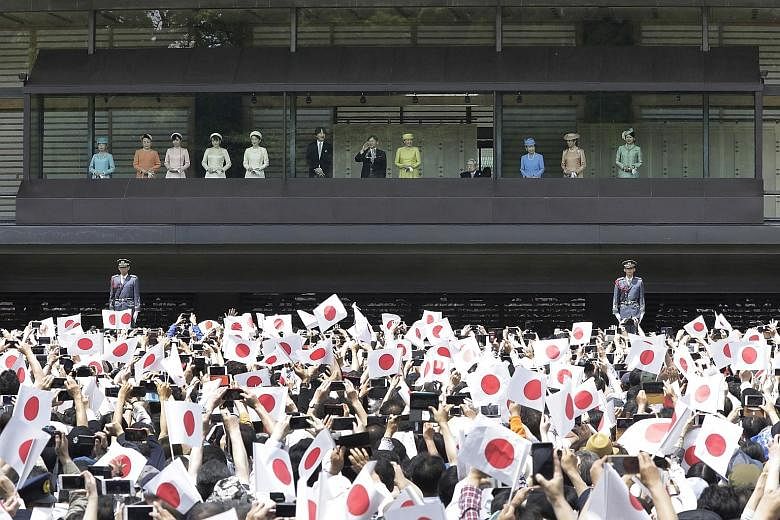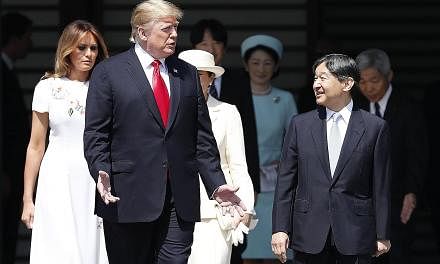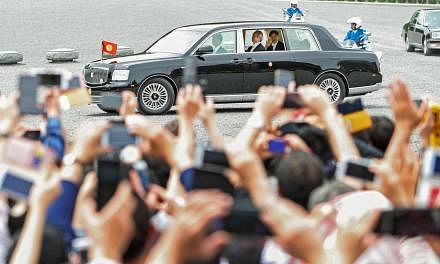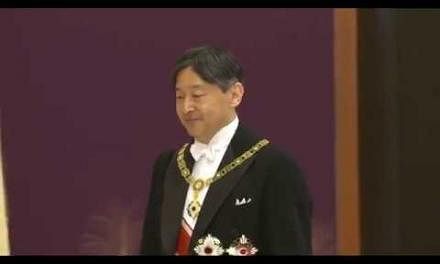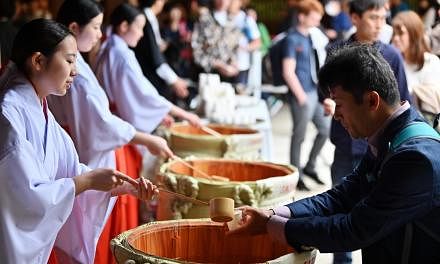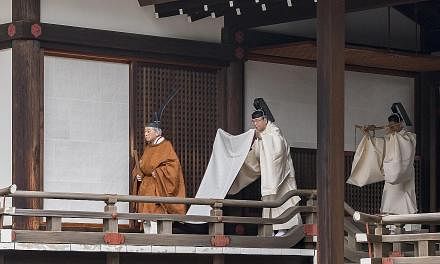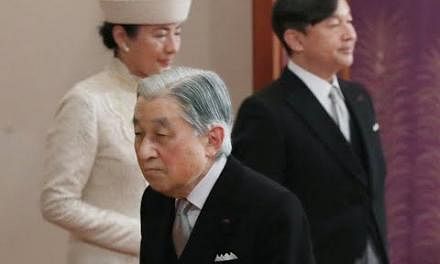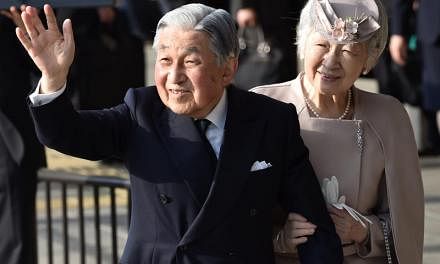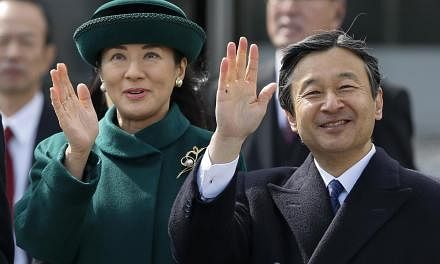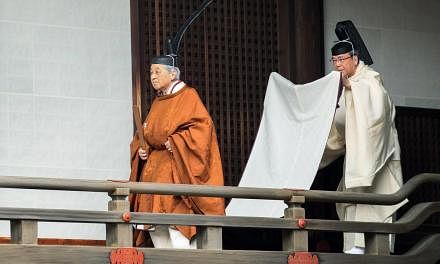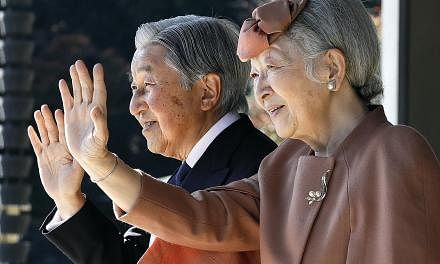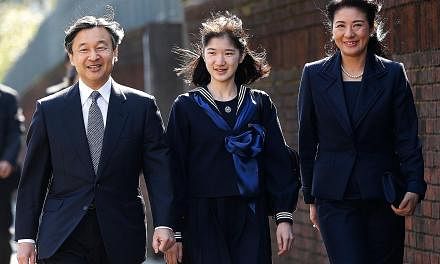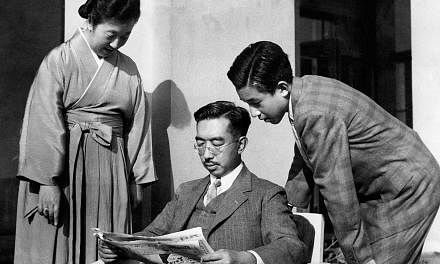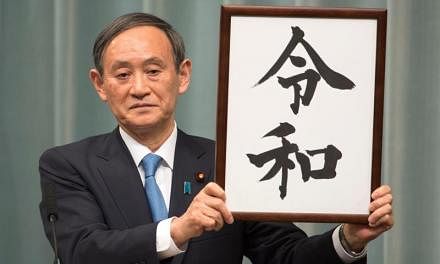Their 15-month-old boy will be too young to remember, or appreciate, the momentous occasion. But this did not stop the Omuras from taking him to the Imperial Palace yesterday to commemorate the ascension of Emperor Naruhito.
However, despite the long journey from their home in Chiba prefecture, east of Tokyo, and the 1½-hour wait in line, they did not manage to catch a glimpse of the imperial family because of the huge turnout.
Still, gym manager Yuki Omura, 35, said the trip was worthwhile, despite the fact that the Emperor appeared on the balcony for only five minutes.
He told The Sunday Times: "We came here to celebrate the epoch-making reign of a new Emperor. We may not have seen him, but we at least got to hear his voice with our own ears."
Japan ushered in the Reiwa (beautiful harmony) era last Wednesday, when Emperor Naruhito, 59, took over the Chrysanthemum Throne from his 85-year-old father, Emperor Emeritus Akihito. The new monarch became the 126th in the line of the world's oldest hereditary monarchy.
The Omuras were among 141,130 people who visited the Imperial Palace yesterday, as the new Emperor extended public greetings at the palace for the first time.
He appeared a total of six times on the hour between 10am and 3pm, with his wife Empress Masako, 55, and several other adult members of the imperial family.
Emperor Emeritus Akihito and Empress Emerita Michiko, who have retired from official duties, did not take part in the events, nor did the underage royals, as is customary.
Loud cheers and chants of "banzai" (eternal life) broke out, with visitors feverishly waving the Japanese flag after Emperor Naruhito prayed for world peace in brief remarks.
"I sincerely hope that Japan will pursue world peace and achieve further development while working hand in hand with other countries," he said.
This struck a chord with Ms Aiko Watanuki, 49, an employee at a carmaker who told The Sunday Times that she was moved by the devotion to peace. Despite an hours-long wait, she said could not pass on the "precious" opportunity to be there.
Another visitor, public servant Yukihiro Nemoto, 56, told The Sunday Times: "(The previous era) Heisei (achieving peace) was significant as Japan did not enter any wars. I am hopeful that Emperor Naruhito will follow his father's path as an emblem for peace not just for Japan, but also for Asia and the world."
Such adulation of the ruler is not unique, and a majority of Japanese would bristle at the thought of dismantling the imperial system.
Surveys by the Mainichi and Yomiuri dailies show that at least three in four Japanese support the imperial system and the Emperor's role as a "symbol of the state and of the unity of the people". A Kyodo News poll also said that 82.5 per cent "felt affection" for their new Emperor.
Nagoya University's Associate Professor Hideya Kawanishi, who studies the imperial family, told The Sunday Times that Emperor Naruhito's pledges to uphold the legacy built by his father - who defined and embraced the symbolic role of the monarchy in the Constitution - have resounded with the public.
He said: "Emperor Naruhito also has the ability to speak directly and to connect with the people."
This was evident yesterday when, as dozens were treated for heat exhaustion, he expressed his deepest gratitude to the public for braving the heat to see him.
Even so, left-wing extremists have used the ascension as cause to protest against the imperial system. A small demonstration broke out in Tokyo last week and a 56-year-old man, Kaoru Hasegawa, was nabbed for putting knives on Prince Hisahito's school desk.
The 12-year-old prince is one of only three heirs in the 18-member imperial family as the Chrysanthemum Throne is reserved for male royals. He is second in line, after his father Crown Prince Akishino, 53, who is also referred to by his birth name Fumihito. Third in line is the new Emperor's uncle Prince Hitachi, who is a wheelchair user and is already 83 years old.
As the current law stands, the Emperor's only child Princess Aiko, 17, cannot succeed him and will be struck off the royal register if and when she marries a commoner.
Although Japan has had eight female monarchs, the principle of patrilineal succession has been adhered to without fail.
Prime Minister Shinzo Abe has previously cited this as the reason he is cool to the idea of allowing female-led imperial houses, even if it means the weight of bearing a son will fall solely on the shoulders of Prince Hisahito as the only male royal in his generation.
Still, four in five Japanese are in favour of a female monarch, the Kyodo poll said.
In the light of this, Dr Kawanishi said that more attention will be paid to Princess Aiko's words and actions than before. She is also on the cusp of adulthood, which is when she will be expected to take on official duties.
Emperor Naruhito has inherited the official duties of his father, and will be joined by Empress Masako when her health permits. She is recovering from a stress-induced "adjustment disorder".
Dr Kawanishi believes there will be a lot of empathy for an empress who has "suffered" and this will make people feel closer to her.
